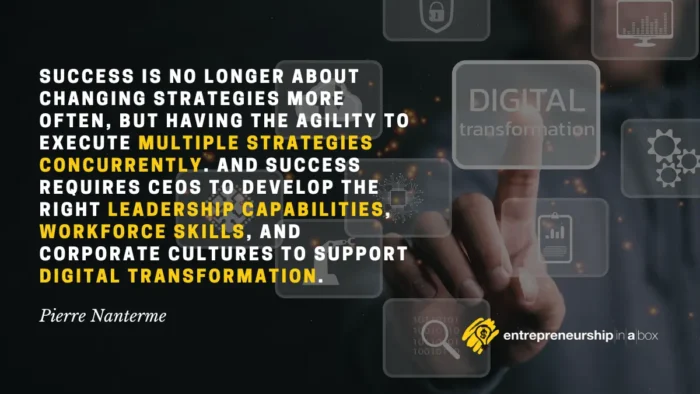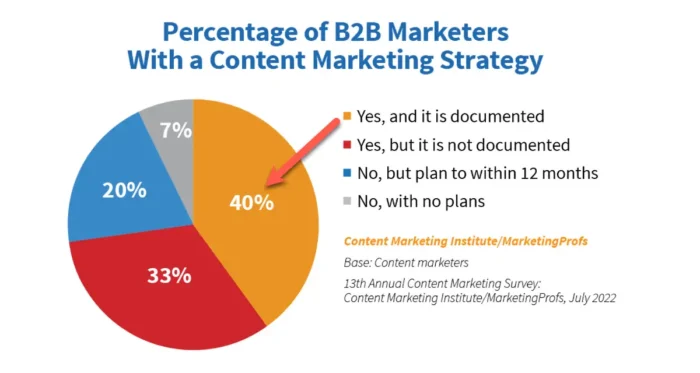In today’s dynamic business environment, success doesn’t come from luck or chance; it results from detailed planning, strategic implementation, and the ability to adapt. It’s a relentless search for growth powered by innovation and guided by a clear vision and success strategies.
Today, your ability to adapt and innovate is crucial to ensure sustainable business success. Searching for the best business strategies becomes critical because all small business owners and business leaders struggle with different challenges.
Whether you’re an entrepreneur just starting out or a business owner looking for ways to revitalize your company, this guide will equip you with the best business strategies you need to triumph in the competitive business arena.
Craft the Blueprint for Success

The business world is a dynamic playground where rules constantly change, and only the best enterprises survive. To carve out your part in this landscape, you need a solid plan – a blueprint that’s as innovative as it is robust.
At the core of any successful business strategy lies the strong focus on your business’s internal processes and its external reach.
Successful businesses know themselves well, understand their market position, and are always aware of the changing needs of their customers. They leverage this internal strength to make an impactful jump into the market, offering products and services that resonate and last.
Your business plan will be your blueprint for success. Running a successful business requires a strategic approach to maintaining success. So, you must ensure that your business plan will include these business strategies.
1. Understand Your Market

Before selling, you need to know who you’re selling to. This is the most important business strategy for your success.
Your market is more than just a demographic; it’s a mosaic of needs, preferences, and behaviors that should inform every decision you make.
Market Research
Market research is your surveillance business strategy. By conducting comprehensive market research, you seek insights into your industry’s size, growth prospects, trends, and key success factors. This in-depth understanding will guide your product development, pricing strategies, and the channels through which you will reach your customers.
Everything will need to start from market research, and avoiding this business strategy can cause problems for your business. You can not expect your marketing to achieve the desired results without market research. Also, your competitive strategy will be wrong without analyzing your market.
In fact, companies that adopt a customer-centric approach are 60% more profitable than companies that don’t. So, if you regularly conduct market research and adjust your business model and marketing strategy to customer-centricity, you will have a better chance of success.
Identify Your Target Audience
Your target audience is the market segment where you execute your marketing efforts. At the same time, your niche is the specific subset of that audience that you aim to serve with unique offerings. Identifying these crucial components allows you to tailor your messaging and product features for maximum appeal.
Your small business success will depend on targeting the right audience for your company. This business strategy will save you time and money by directing your efforts toward the most profitable market segment.
With this business strategy in mind, constantly evaluate and adjust your target audience as needed. Remember that your customers’ preferences may change over time,
Related: How To Reach Your Target Audience and Sell Your Product
2. Build a Strong Brand

In today’s marketplace, an effective business strategy like building a strong brand isn’t a luxury; it’s a necessity. It must be part of your business plan because your brand is the face of your small business, the sum of its characteristics, values, and promises it makes to customers.
Branding Strategies
Developing a brand strategy means defining what your brand stands for, who it’s intended to reach, and what it promises. Through a blend of creative marketing and consistent visual and tonal elements, you will create a brand identity that stands out and remains memorable for your target audience.
A strong brand strategy can increase your business’s value, build customer loyalty, and differentiate you from competitors. It also guides all aspects of your small business, from product development to customer service.
Remember that you must measure and continuously improve your brand potential.
Creating a Unique Value Proposition
Every successful business has a unique value proposition (UVP) that sets it apart from competitors. Your UVP is the reason customers choose you over the rest, and it should be clear, compelling, and effectively communicated in your marketing materials.
To craft an effective UVP, you must first identify what makes your business unique. What are your core business values? Do you offer a product that solves a problem no one else has? Do you have exceptional customer service or unbeatable prices?
Learn what sets you apart and use it to create a strong UVP.
3. Adopt Digital Transformation for Sustainable Growth

In today’s tech-dominated age, digital transformation is an effective business strategy. Your business must use the power of digital technologies to make its operations more effective and create value for customers. Only in such a way you can achieve business success.
According to Gartner, 91% of businesses are engaged in some form of digital initiative, highlighting the widespread priority of digital transformation. Look at the last five years. You can easily see many new technological innovations, especially in digital transformation, like cloud computing and AI.
I have an example with one company I have worked as a consultant. Before starting the change process, all of their operations were manual, from getting orders for their services to producing and delivering them. We start the digitalization process on a small scale, first digitizing working orders, from clients’ requirements, doing the service work (repair) to quality control and customer satisfaction measurement.
The outcomes of these changes were amazing. The productivity was up by 42%, and time from order to delivery was down by more than 50% compared with the situation before the changes. These results were not only because of the simplified processes we achieved but also because of improved customer experience and much better decisions for continuous improvement based on valid information.
To implement a digital transformation business strategy in your own business, here are some areas where you must focus:
IT Modernization
Up-to-date technology always improves your business efficiency. From cloud computing to advanced software solutions, modern IT brings high flexibility and scalability, two critical factors for long-term growth and ensuring profitable business operations.

Related: 100 Business Improvement Ideas for Your Small Business for 2024
Process Automation Business Strategy to Improve Efficiency
Process automation will eliminate time-consuming manual tasks, reduce errors, and improve your business productivity. Whether in manufacturing, sales, or customer service, simplifying processes is key to working smarter, not harder.
As a business owner, ensure that you have installed continuous improvement processes inside your business through continuous process analysis and implementing improvements to increase process efficiency.
Adopt Artificial Intelligence in Your Operations
AI applications such as machine learning and predictive analytics empower businesses to make better decisions and anticipate market changes. A business that uses AI has a significant competitive advantage because it can process massive amounts of data, reduce errors and labor costs, improve customer service, and predict future market trends.
4. Use Data Analytics for Informed Decision-Making

Informed decision-making driven by robust data analysis allows your business to move confidently, knowing that real data supports your business strategies.
Data analytics will help you understand customer preferences, optimize your processes, and identify specific and vital market trends. Using sophisticated analytics tools, you can gain a competitive advantage by making informed decisions based on real-time data.
Whether we talk about predictive analytics that will help you predict market trends or some specific customer analytics to personalize customer experiences, you must integrate data-driven approaches that are key to making your business successful.
This was also crucial for the company I talked about in the previous business strategy to record data from the first arrival of their customers requiring repair service for their equipment to measure their satisfaction when they get their equipment.
5. Use Effective Marketing Techniques

Marketing is an important business strategy for success because it highlights your business’s strengths and strengthens your marketing approach and message to the right audience.
Digital Marketing Strategies
When discussing business strategies in the digital age, we can not overlook digital marketing strategies. Digital ads can increase brand awareness by 80%, emphasizing the significance of online advertising in a successful digital marketing strategy. Today, the traditional marketing approach is insufficient for company growth.
Digital marketing covers various tactics, from search engine optimization (SEO) and PPC ads to email campaigns designed to increase your online presence and attract more customers.
Social Media Marketing
Social media isn’t just a tool for engagement; it’s a platform for storytelling and building communities around your brand. You can create brand advocates and drive sales with the right social media strategy.
For instance, many researches show that more than 70% of consumers rely on their social networks to make purchasing decisions, making an active and thoughtful social media presence invaluable. Also, people use social media to research products, so you must present your product information effectively and engagingly on these platforms.
Some of the key elements you must include in your social media strategy are the following:
- Content calendar. Develop a content calendar that outlines the type of content to be shared. Ensure a balanced mix of educational content, promotional posts, and interactive media to keep your audience engaged.
- Brand voice and visual identity. Maintain a consistent brand voice and visual identity across all posts. This facilitates brand recognition and strengthens branding, as consistency in messaging reinforces trust and professionalism.
- Engagement and community building. Social media is a two-way street. Make sure to interact with your audience by responding to comments, messages, and reviews. This active engagement fosters community and shows that the brand values its customers’ input.
- Metrics and analytics. Measure the performance of your social media activities through metrics like engagement rates, growth in followers, and conversion rates. Analyze these metrics to refine your strategy effectively.
- Paid social media advertising. You can use targeted advertising options available on social media platforms to reach a wider audience. Plan your ads strategically based on data-driven insights about your audience’s behavior and preferences.
- Influencer partnerships. Collaborate with influencers whose followers align with your target audience to extend your reach and enhance credibility through authentic endorsements.
- Negative feedback management plan. Prepare a plan to address negative feedback promptly and professionally to maintain your brand’s reputation.
Content Marketing: Providing Value Beyond Your Product
Content marketing as a business strategy means sharing knowledge and insights related to your industry, fostering trust, and positioning your brand as a thought leader. You can attract and retain customers by providing value beyond your product or service.
So, you must include content marketing in your growth strategies because there is a huge potential for your business success. Did you know that 40% of B2B marketers have a documented content marketing strategy?

This business strategy includes:
- Writing blog posts on your own blog and as a guest post on other blogs.
- Recording, editing, and sharing short and long-form videos on YouTube, TikTok, and Instagram Reels.
- Sharing informational and educational content on social media accounts.
- Creating ebooks, whitepapers, and other downloadable resources to establish expertise and generate leads.
- Hosting webinars or workshops to share knowledge and engage with potential customers.
- Collaborating with influencers or industry experts to reach a wider audience and build credibility.
Prioritize Customer Experience to Build Loyalty
Ensuring extraordinary customer experience is an effective business strategy to increase customer loyalty. By focusing on improving every touchpoint a customer has with your business, you lay the foundation for a loyal customer base.
In an age of plentiful customer options on the market, prioritizing customer experience is one of the best business strategies if you want your businesses to succeed. So, using data from your customer relationship management systems to analyze customer feedback and ensure consistent communication is crucial to building a solid and successful customer experience strategy.
Only in such a way will you understand and exceed customer expectations and build long-lasting relationships that translate into repeat business, positive word-of-mouth, and an improved brand reputation.
6. Financial Management Business Strategy for Success

A business without a handle on its finances is like a ship without a compass—directionless and at the mercy of the elements. Sound financial management must be part of your business strategy because it ensures stability and fuels growth.
Budgeting and Forecasting
Setting and sticking to a budget is the first step in financial planning. Forecasting helps you predict future financial outcomes and plan accordingly, whether that means scaling operations or investing in new initiatives.
Effective budgeting involves setting a specific financial framework for your business activities, ensuring that you operate within your means, and prioritizing spending in areas that drive growth.
Forecasting, on the other hand, extends the insights from budgeting into the future, projecting income and expenses based on historical data, market trends, and business objectives. This dual approach allows for a disciplined financial regimen and prepares businesses to pivot and adapt in the face of market volatility.
Cash Flow Management

Cash flow is the lifeblood of your business. Managing it effectively ensures you can meet your short-term obligations and take advantage of opportunities for investment and growth.
Remember that effective cash flow management is a fundamental aspect of a sound financial management strategy and is crucial for the sustainability and prosperity of any business. To manage cash flow is to have a keen eye on the timing and amount of money flowing in and out of the business. It’s not merely about tracking the revenue or profits but understanding the liquidity of your business at any given time.
Cash flow management includes monitoring accounts receivable and payable and optimizing the timing so inflows can effectively cover outflows. Strategic planning can improve cash flow, such as discounts for early payments or favorable credit terms with suppliers. Maintaining a cash reserve can also shield the business against unexpected shortfalls, thus securing continuity.
Strategic Accounting Practices for Financial Excellence

Beyond the basics of financial management, strategic accounting practices help you optimize your tax burden, manage risk, and make informed financial decisions that lead to success.
Integral to any successful business is having a robust accounting strategy beyond mere compliance and financial record-keeping.
To implement strategic accounting practices, you must maintain accurate financial records and utilize data-driven insights to make informed financial decisions. Your business can use cloud-based accounting software for real-time financial visibility, automate routine tasks for increased efficiency, and conduct regular financial audits to ensure compliance and identify possible improvement areas.
Suppose you understand the organization’s financial health. In that case, you can optimize resource allocation, manage cash flow effectively, and strategically plan for future growth. Strategic accounting practices provide a solid foundation for financial excellence and contribute to a thriving enterprise’s overall strength and success.
You can grow your business with the Jameco Group or any reliable company that can be a trusted partner in providing comprehensive financial solutions adjusted to your unique needs. Their expertise extends outside traditional accounting so that they offer strategic insights that align with your growth objectives.
7. Adapting to Change as a Successful Business Strategy

The markets you operate in constantly change, and your business must be prepared to pivot when necessary.
Agility and Flexibility in Business
Cultivating a culture of agility means your business can adapt to change quickly and decisively, whether that change is driven by external market forces or internal innovation.
Today, you can not escape uncertainty. So, your ability to adapt quickly to outside changes and forces is a distinctive factor for successful companies. You must develop agile strategies that will help you become responsive to change, adopt flexibility, and remain attuned to market dynamics.
So, start by implementing agile project management methodologies, promoting a culture of adaptability, and continuously monitoring industry trends as essential elements of an agile business strategy.
This proactive approach will reduce risks and position your business to capture occurring opportunities, ensuring sustained growth despite uncertainty.
Adopt Innovation and Trends
Don’t just react to change—be a driver of it. You can stay one step ahead of the competition by constantly seeking out and adopting new innovations and trends in your industry.
I have often discussed that innovation is the heartbeat of successful businesses, and developing a culture of continuous innovation and improvements is necessary for long-term success. So, you must have processes that will encourage employees to think creatively, experiment with new ideas, and embrace change, promoting an environment where groundbreaking solutions can emerge.
When you use cross-functional teams, invest in employee training programs, and recognize and reward innovative efforts, you can contribute to a culture that values and drives continuous improvement. This mindset will keep your business relevant to any outside change source, and you can position your company as a leader in its industry.
One of the things that we have implemented in the company is to have a 30-minute meeting with all employees every Monday, where each of them will propose how they can improve the processes for their workplace. If we agree on the proposed change and get better results, then the team member who submitted the change is rewarded. This small change in the company’s operations was a big step to entering a never-ending improvement process.
Conclusion
The strategies we’ve explored here are not standalone solutions but interconnected parts of a larger whole. By understanding your market, building a strong brand, embracing digital transformation, using data to drive decision-making, excelling in your marketing efforts, optimizing operations, managing your finances wisely, and staying agile in the face of change, you can chart a course for sustained success.
Business success is not a static destination; it’s an ongoing growth, adaptation, and innovation process. Armed with the right strategies, your business can weather the storms of the market and find new heights to soar.
It’s time to infuse these strategies with your unique business approach. As you do, remember that the most successful business structures are agile—they flex and bend with the challenges of the market. Stay nimble, stay informed, and above all, stay focused on the goals you’ve set. The future of your business is as bright as the strategies you employ to light the way.





